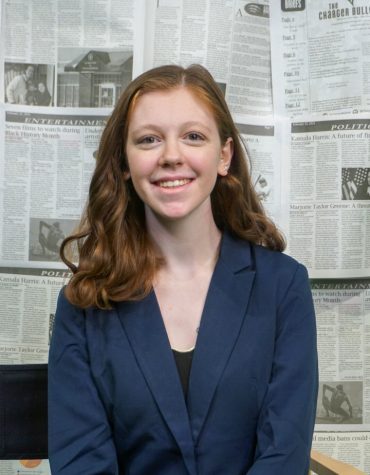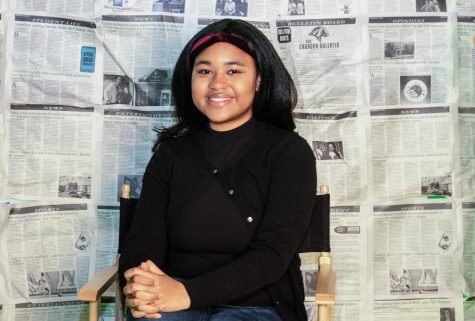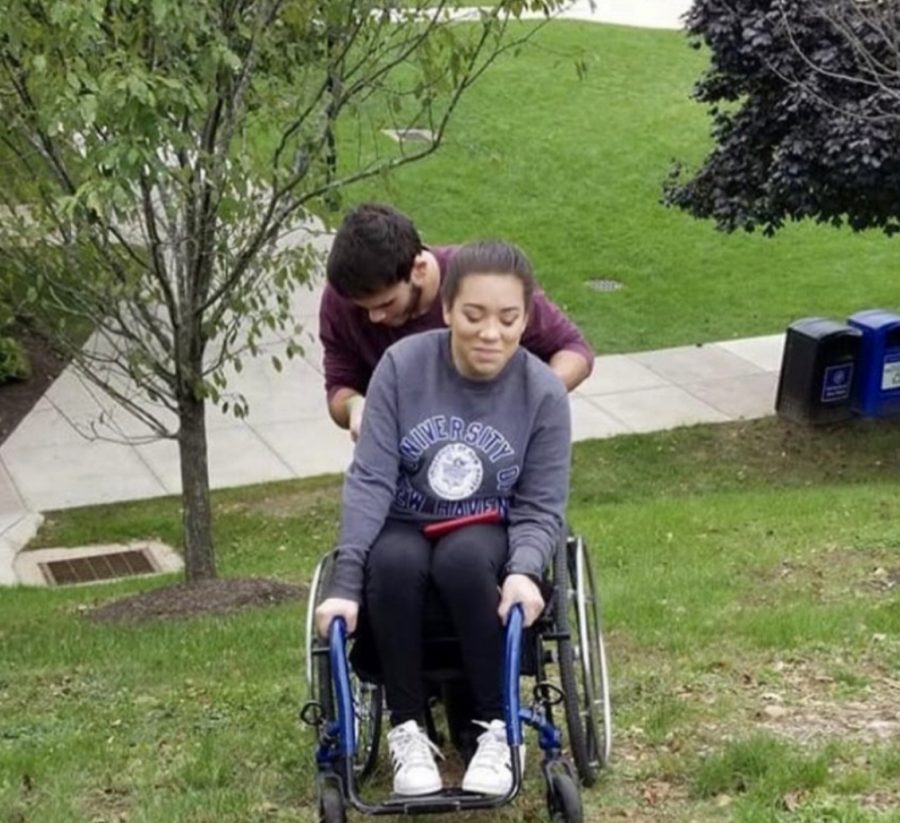Accessibility issues prompt student with wheelchair to leave university
Continuation of “Student with Wheelchair Speaks Out About Campus Inacessability and Safety Issues.”
Maria (Ria) Maisonet spent her freshman year at the University of New Haven fighting to make the campus more accessible. Maisonet has Charcot-Marie-Tooth type 1E, a neuromuscular disease that affects muscle and nervous system function, requiring her to use a wheelchair. Maisonet had faced issues including teachers being unwilling to move classrooms that were not wheelchair accessible and living on the second floor of Bergami Hall, an on-campus dormitory where it would be difficult for her to exit the building safely in case of a fire drill.
The year of struggle to get proper accommodations ended with Maisonet filing a grievance of the Americans with Disabilities Act (ADA). The dean’s office opened an investigation against faculty members that she had difficulty working with, including former dean of students Rebecca Johnson and director of the campus Accessibility Resource Center (ARC), Linda Copney-Okeke.
After filing and receiving the results of the grievance, Maisonet said that the results were ineffective and decided to leave the university.
Maisonet said that the publication of the article helped students become more aware of the accessibility issues on campus. It led to The Undergraduate Student Government Association (USGA) reaching out to see if she wanted to be the senator for disabled students. Maisonet originally planned to accept the offer, but by the third week of August, she had withdrawn from the university. As of now, the senator for disabled students position has not yet been filled for the fall 2020 semester.
Maisonet said that COVID-19 was a factor in her decision to withdraw, but that she had already been considering transferring because of her negative experience with the university.
“With COVID, watching all those town halls of everything that was gonna change. Things were going to be limited,” said Maisonet. “The very few things that I enjoyed were getting rolled back, scaled back, minimized. I just took a hard look in the mirror and was like ‘is this worth it?’”
“I am transferring from my university because I am disabled, accessibility is horrendous and they are abiding that they are not going to change,” said Maisonet.
Maisonet said that she saw other students be proud to be a part of the university community, but could not understand why. She said, “It made me bitter and it even made me a bit resentful in the fact that I could not understand or connect with other people at school.”
“I wasn’t proud to say where I went to school,” Maisonet said.
When researching new schools, she made sure to research previous accessibility issues that the schools had. When talking to admissions at schools such as Vanderbilt University, located in Tennessee, and the New York Film Academy, Maisonet found that the admissions counselors were not afraid to admit what their schools needed to work on. This was a surprise to Maisonet, as she said that the University of New Haven had falsely promoted accessibility on campus.
Maisonet stated that she felt like a “token disabled student” through noticing that the university used her in promotional material highlighting diversity on campus. She said that photos were always being taken of her and that an article about her was published on the university website before she came to campus.
Maisonet said that she had one professor reach out to her after the publication of the article, but that ARC and other offices did not.
The Charger Bulletin emailed the senior associate dean of students Ric Baker and Copney-Okeke, who were both involved in Maisonet’s case, and the new dean of students Ophelie Rowe-Allen. Each was emailed individually to ask how student feedback has impacted the plans to improve accessibility on campus and was provided with a link to the article. On Nov. 3, the three staff members sent the Charger Bulletin a combined statement about the issue.
The statement said, “At the beginning of the Fall 2020 semester, the Dean of Students formed an Accessibility Working Group with the ARC to continue to assess all spaces across campus and the support services available to ensure we continue to provide reasonable accommodations for all students.”
“We encourage students who have concerns regarding any University accommodations to contact ARC as soon as possible to resolve any questions they might have,” it said.
Vice president for diversity and inclusion and chief diversity officer Lorenzo Boyd is working towards improving accessibility on campus. Boyd said that he read the article on Maisonet before stepping into his new position and now works closely with the provost office and ARC. He said that they always think of the students first and that when they create events or try to anticipate issues, they look at it from all angles, including accessibility.
“We are trying to predict ahead of time what is likely to happen or what is likely to be [an] impediment for students, and we’re trying to remove those before you get to it,” said Boyd. “So if you can move through without barriers, that means we’re doing our job.”
One of the ongoing issues on campus is that many of the old buildings aren’t wheelchair accessible because of how long ago they were built. Boyd said that he does not know of any plans to update any buildings, but that he believes changes are being considered. Boyd also said that one of the first things he asked for when he received his new position was an increase in gender-inclusive bathrooms. When talking to the assistant vice president of facilities Louis Annino, Annino responded by acknowledging bathrooms need to become more handicap-accessible.
“So I know that they know about it,” Boyd said. “My thought is, if they’re thinking about it on a finite level like a bathroom, they have to be thinking about it at a macro level, like a building.”
“We’re always looking to expand, we’re always looking to increase access for students,” said Boyd.
Maisonet’s withdrawal from the university because of these accessibility issues shows that work still needs to be done.
“They can’t increase the percentage of disabled students for campus to be more diverse because it all depends on who applies, but [the university] can make it a safe space so that people are more apt to apply and they feel more comfortable picturing themselves for the next four years there,” said Maisonet.

Beth Beaudry is a senior majoring in communication with a double concentration in journalism and public relations, and a minor in English. This is her...

Tiara Starks is a senior communication major with a concentration in film production. She started at the Charger Bulletin as a contributing writer in 2018,...











